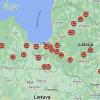DigLib Research Report "Digital libraries for inclusive learning: A cross-national study on skills, practices, and innovation"
The Digital Libraries (DigLib) project has published their first major report: "Digital libraries for inclusive learning: A cross-national study on skills, practices, and innovation". This open-access research report presents the findings of the DigLib project’s research activities which explore how librarians are engaging with digital education - and where they need more support.
About DigLib
‘Digital Libraries’ (DigLib) is an Erasmus+ project running from 2025-2027, which will harness the potential of public libraries as inclusive community hubs for lifelong learning. The project brings together five partners across four EU countries: FRSI (Poland), PL2030 (Belgium), EOS (Romania), CSBNO (Italy), and Dot Beyond (Italy).
The role and services of the library continues to evolve and expand alongside rapid societal digital transformation. Over the next three years, the consortium will leverage the power of non-formal education to provide librarians with the skills to adapt to these challenges, empowering them to develop solutions which promote inclusivity, education, and social cohesion.
By mapping digital skills, delivering capacity-building programmes, and creating a dynamic digital education environment, DigLib fosters social inclusion and equips librarians to bridge the digital divide.
Research activities
FRSI (Poland), PL2030 (Belgium), EOS (Romania), CSBNO (Italy) contributed to the collection and analysis of data in their respective countries. This robust research framework that combines quantitative and qualitative methodologies included:
- A cross-national digital skills audit survey completed by 270 public library staff across Italy, Poland, Romania, and Flanders;
- Desk research reviewing academic and non-academic training opportunities, national library landscapes, and relevant European initiatives;
- Expert interviews with 12 professionals across the four countries;
- Four national advisory boards providing feedback and consultation via focus groups;
The report also includes a collection of 15 case studies illustrating innovative practices from within and beyond the partner countries.
Findings and recommendations
The research findings highlight a shared recognition among all participating countries of the critical role libraries play in promoting digital inclusion and education, particularly for adults at risk of digital exclusion. While many public libraries demonstrate strong motivation and foundational skills, the study reveals a shared need for advanced digital competencies, pedagogical training, and access to emerging technologies like AI, VR, and data tools. This research serves as the foundation for the design of DigLib’s training methodology and immersive learning platform, and provides a comprehensive analysis of the evolving role of public libraries in a digital society.
Importantly, the report doesn’t just identify gaps - it provides a roadmap. Key recommendations include creating hands-on, modular training programmes tailored to national contexts, empowering librarians to become digital facilitators and community educators. Special attention is also given to helping underserved groups such as older adults, migrants, youth, and job seekers access the skills they need to thrive in a digital society.
Whether you're a librarian, adult educator, policymaker, or digital inclusion advocate, this report serves as a resource to inform sustainable, inclusive, and future-ready library services.
The DigLib research report is available to download on the project website.
Digital skills resource details
Reserach report



